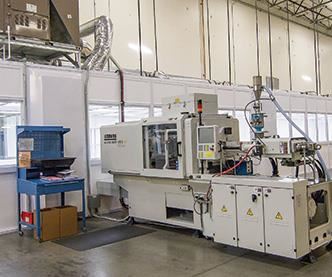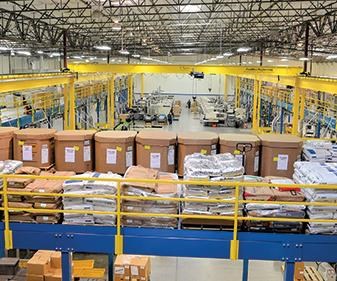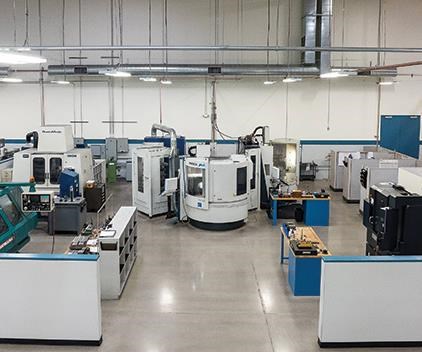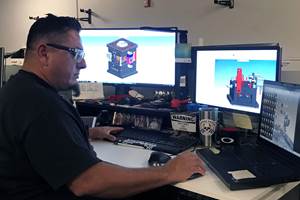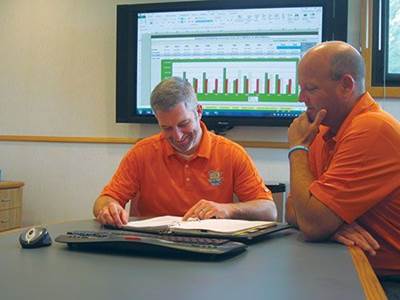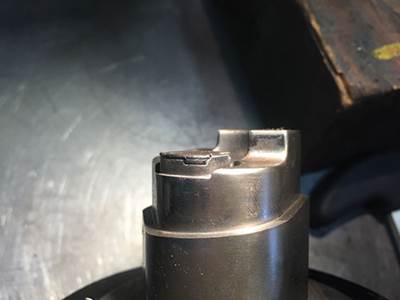El Dorado Molds Stakes Claim on Calculated Growth
This California moldmaker is now reaping the benefits of its well-laid plans.
Sometimes the best-laid plans do work out, contrary to the old Scottish poem. At least they did for El Dorado Molds, which has staked its claim in California Gold Rush territory and is reaping the benefits of well-laid plans for physical expansion and profitable growth.
Based in Rancho Cordova, California, in the greater Sacramento area, El Dorado, which means gold or golden in Spanish, takes its name to heart, marketing itself as a “Golden Rule company.” Since its founding by company President Robert Brewer in 1989, it has strived to supply world-class injection molds to a variety of industries, including automotive, custom eyewear, electronics and healthcare. As a “Golden Rule company,” El Dorado Molds says it forms partnerships with its customers that are based on trust, dignity and quality.
New Growth Opportunities
In 1997, to meet increased customer demand, Brewer turned El Dorado’s mold sampling services into a separate, fully equipped production molding company and called it Northern California Injection Molding, or NCIM. For several years, it was situated about a half mile from the El Dorado moldmaking plant. About four years ago, El Dorado Molds decided it was time to bring both companies together under one roof. Real estate prices were favorable, and an existing 90,000-square-foot building located on about four industrial acres was purchased in Rancho Cordova. According to Glen Shrigley, vice president of operations for both El Dorado Molds and NCIM, the move gave the companies better leverage to offer customers a full-service solution, and both companies have flourished.
Shrigley had 25 years of experience with building, equipping and managing manufacturing facilities when he joined El Dorado Molds in 2004, and that experience came in handy when the current building was purchased.
“Bringing everything under one roof has been a real competitive advantage for us,” he says. “One reason is that it’s much more convenient for customers when they visit to see how we can provide end-to-end solutions.”
It also makes managing both companies more efficient and cost-effective, he says. For example, it enables convenient cross-training of employees who are being groomed for duties within both companies. Perhaps more importantly, it also has allowed Shrigley to ensure that his toolmakers and molding department personnel are working cohesively together. Shrigley says he has worked to break any “attitudinal barriers” between employees of each company, and he is the main “conduit” between them. He’s fervent, he says, about both companies running as one, and he believes strongly that communication is the key. “The culture of a toolroom and its moldmakers is very different from the culture of production, because each has its own perspective and specific needs based on the work they do,” he says. “They are all passionate about their work, and tempers can flair when things are not running smoothly. To keep everyone working toward a common goal requires a lot of meetings and a more structured exchange of information.”
Everything within the building’s setup was very carefully planned with future growth in mind, Shrigley says. For example, when 2,000 amps of power would have been sufficient, 4,000 amps were installed to ease future expansion. A water tower system was also set up, so that as new machines were added, nothing critical would be missing. “You should never short-change yourself in capacity for power and water,” he says. “You usually grow faster than you think you will.”
The layout and organization of the operations were also improved with the move, he says. A mezzanine conveyor system was installed above the shop floor, enabling materials to be stored near the point of use and fed down to molding machines as needed. Molded parts then can be moved efficiently to a final inspection area. “It’s all designed so that everything functions very smoothly while at the same time making the work environment much cleaner, with fewer wasted actions in the process,” he says
NCIM has 30 molding machines, including new 90-ton and 500-ton Nissei machines that were added recently to better serve a particular automotive customer. The building can accommodate 50 machines, Shrigley says, and as many as four more will likely be added sometime later this year.
In January, NCIM added their first Class 100,000 (ISO Class 8) clean room for manufacturing medical devices, including medical disposables. Orders for these types of devices have increased since the companies announced the addition of the clean room, Shrigley says. The companies had used portable cleanroom setups almost non-stop since the move four years ago, but this new 1,200-square-foot dedicated structure currently houses one 88-ton molding machine and has room for seven more machines that will range in capacity between 50 and 150 tons as that portion of the business grows, he says. Overall, NCIM’s molding tonnage currently ranges from 40 to 500 tons with the addition of the 500-ton Nissei that was purchased for molding larger automotive parts.
Aligning Globally
Part of El Dorado Molds’ future growth strategy is global. The company currently provides program management for offshore tool builds, serving as as a global network procurement partner for OEM customers. As such, Shrigley’s team reviews the customer’s designs to ensure that components used in the foreign-made molds are made in the United States and globally available. “It’s our responsibility to control the integrity of the mold and the molded part,” he says. “If any issues come up, we can solve them more efficiently, because we know exactly who the suppliers are.” When an OEM customer hosts technology events, El Dorado Molds and NCIM attend to connect with decision-makers from all of the customer’s divisions and become their procurement partners as well.
El Dorado Molds’ global reach includes both foreign molders who want U.S.-built molds and U.S. molders who use foreign-built molds. For example, the company has a 10-year alliance with two mold manufacturing companies in China, and one of its moldmakers travels to China multiple times each year to manage tool builds, sample the molds and bring them back to the U.S. for production. Shrigley says that, while the company strives to keep its toolroom busy, the lower cost offshore option has been popular among its U.S. molding customers, because those customers know that El Dorado Molds will manage the mold builds to ensure that their requirements are met. This reduces customer risk, too, because El Dorado Molds keeps files on foreign-built molds so that it can then properly maintain those tools from the time they arrive in the U.S.
Tooling U-SME and Apprentices
To help keep up employee-wise with all of the company’s growth and expansion, El Dorado Molds established a federally accredited apprentice program in 2009 through a partnership with Tooling U-SME, a workforce development program of the Society of Manufacturing Engineers. Each apprentice must complete 121 courses out of a possible 500 that are offered over a four-year period, but before the apprentice can even begin the program he or she must first go through a six-month evaluation process.
“We can tell by the end of the six months whether they have the drive, the mechanical ability, the math aptitude, etc., to be a moldmaker,” Shrigley says. “If they want to go into the program, they first have to be accepted into the program.”
Once accepted, the selection of courses is customized to each apprentice. An Apprentice Board set up by El Dorado Molds reviews the apprentices’ projects, and tracks their progress and grade point averages monthly. Every six months or 1,000 hours, the apprentices are evaluated for a pay increase. Additionally, apprentices must attend a “shop night” each week during the four years of their apprenticeships in which they stay late to work on making tools they will use in the shop. By the time they finish the program, apprentices will have put in 9,000 hours of shop time in addition to time spent taking Tooling U online courses, and they should be at or close to a journeyman’s salary if they have met all the criteria, Shrigley says.
“It’s very difficult to find someone who has the right skills and hire them,” he says. El Dorado Molds’ apprenticeship program is designed to make sure new hires attain these “right” skills.
Shrigley says he is proud of the way things have come together since El Dorado Molds and NCIM came together in the new building, including doubling combined sales over the last five years. “We built this building with a plan for the future,” he says. “We did things right.”
Related Content
How to Improve Your Current Efficiency Rate
An alternative approach to taking on more EDM-intensive work when technology and personnel investment is not an option.
Read MoreMold Design Review: The Complete Checklist
Gerardo (Jerry) Miranda III, former global tooling manager for Oakley sunglasses, reshares his complete mold design checklist, an essential part of the product time and cost-to-market process.
Read MoreSteps for Determining Better Mold Prices
Improving your mold pricing requires a deeper understanding of your business.
Read MoreTop 10 Topics to Cover During an ISO 9001 Manufacturing Audit
Take a look at this practical hands-on approach to conducting a quality audit.
Read MoreRead Next
Planning for Success
A consultant that helped one shop improve quote-capture rate by more than 50 percent offers his take on what makes a business plan successful.
Read MoreLaser-Focused on Lean
This toolroom made significant strides in reducing waste and improving workflow with the addition of just one piece of equipment: a mobile, flexible laser welding system.
Read MoreAre You a Moldmaker Considering 3D Printing? Consider the 3D Printing Workshop at NPE2024
Presentations will cover 3D printing for mold tooling, material innovation, product development, bridge production and full-scale, high-volume additive manufacturing.
Read More
